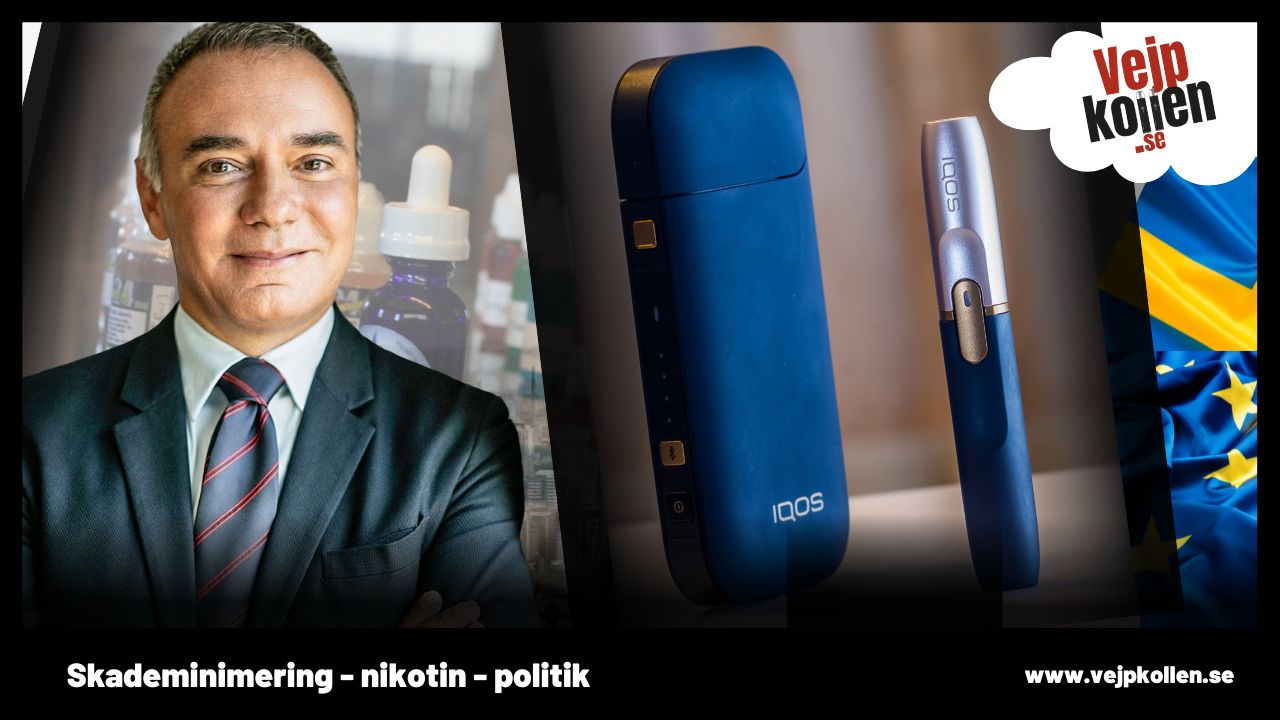Opposition to new nicotine products, such as e-cigarettes, heated tobacco and nicotine pouches, could lead to increased cigarette sales. This is according to Massimo Andolina, the European Director of Philip Morris International. He also believes that tobacco companies, such as Philip Morris, must take responsibility for this development, as well as policy makers.
"Let's be clear: we need to be responsible when launching new products, with flavours, product design and packaging that do not attract the wrong audience. We also need legislation to prevent young people from starting to use nicotine. But we absolutely need to regulate products in a way that recognises the different risk profiles." says Massimo Andolina to Vejpkollen.
PMI on the warpath
Spring 2023: For those who have been paying attention, it has been a six-month period where harm minimisation and Sweden in particular have been in focus. Several campaigns and initiatives have rolled out, mainly in social media, where the issue of Sweden's low smoking rate has received attention. Snus and a relatively mild legislation for e-cigarettes and nicotine pouches as well as a comprehensive smoking ban are seen as key factors behind its success. Initiatives range from health organisations, organised doctors to harm minimisation activists and active users, but also some tobacco companies. Recently, Philip Morris International convened a press conference and delivered a clear message.
"Sweden is the European example that the rest of the EU should study and learn from. Instead, it stubbornly clings to a policy that does not challenge existing norms and instead puts obstacles in the way of a smoke-free society," said PMI's CEO. Jacsek Olczak and excited the eyes of the audience.
The PMI is on the warpath.
Focus on snus and IQOS
When Vejpkollen meets Massimo Andolina the press conference is over and the journalists have gone to their desks. Massimo Andolina is responsible for PMI's European business and has been with the company for almost 15 years. He was there when PMI started talk about harm minimisation in the early 2000s and has seen the launch of IQOS, the electronic tobacco heating device that PMI has invested billions in developing, in 2015. Since then, PMI has acquired and developed technologies ranging from electronic cigarettes to ready-to-use concepts such as snus and nicotine pouches. PMI's harm minimisation portfolio grew significantly with the acquisition of Swedish Swedish Match last year.
"If you had told me 10 years ago that we would have 35 per cent of our income from something other than cigarettes, I wouldn't have believed you," he says. Massimo Andolina via video link from Lausanne, where PMI has its European headquarters.
From science to education
For Massimo Andolina the future is about convincing the world that harm reduction serves as a third pillar of tobacco policy, after prevention and cessation. Harm reduction should be available to smokers who, for whatever reason, do not stop using nicotine, says Massimo Andolina.
'A few years ago, our focus was to show the scientific basis for tobacco harm reduction. Now there is a consensus on that basis. The current obstacle is to inform society as a whole, and especially smokers and policy makers, about the harmfulness of combustion, the scientific advances in tobacco and nicotine products, and to establish an open dialogue with everyone. Society would benefit from breaking down the dogmas and preconceptions that exist and we need to build trust. Harm minimisation has a very important role to play. Already today, we can see the health impact of smoke-free products on public health - we have already seen it in Scandinavia, especially Sweden, but now also in Japan," says Mr Perez. Massimo Andolina.
Heat-not-burn in Japan
In many ways, Japan became PMI's test market for the Iqos heat-not-burn system and the associated Heets/Terea - the modified cigarette that uses a heating process to create vapour instead of smoke. It was successful. 35 per cent of all tobacco sales in Japan now consist of Heets/Terea. Iqos has a similar harm profile to a traditional e-cigarette, although independent research has yet to prove the extent of the harm minimisation effect. However, PMI's own research is sufficiently convincing that British health authorities puts heat-not-burn in the same category as e-cigarettes in terms of harm from nicotine use.
"The past weighs heavily"
In countries like United Kingdom and New Zealand the concept of harm minimisation is now well established in nicotine policy. In Sweden, it can be in the near future. But in the rest of Europe it looks different. Resistance to harm minimisation is large, regardless of whether it is tobacco companies or someone else who conveys the message. Something that is understandable, but at the same time very unfortunate, according to Massimo Andolina.
"Unfortunately, the past can still weigh heavily. For some people, it is difficult to move away from the past. They resent that the industry that created the problem of smoking should be allowed to be part of the solution. The strategies and laws used to tackle smoking come from a time when heat-not-burn or e-cigarettes did not exist. Now, thanks to science and technology, there are better products than cigarettes on the market."
Seeing Sweden as a role model
He sees Sweden as a role model when it comes to smoking. Especially since the results of the Swedish model led to very few smokers and significantly less harm from nicotine use.
"It is important to clearly highlight the fact that Sweden not only has few smokers and many snus users, but also the least amount of smoking-related diseases in Europe," says Massimo Andolina.
The importance of open dialogue
'Sweden's journey from a smoking nation to almost no smoking at all has been going on for over 40 years,' he says. He compares it to how the car industry works with authorities to create more environmentally friendly cars - with the aim of jointly reducing fossil fuel emissions. Massimo Andolina says that the analogy becomes clear in Sweden, the country that invented the seat belt, an innovation that was not easily accepted and took about 15 years to regulate as an integral part of all cars.
"There has been an open dialogue between consumers, regulators and industry here. It has obviously had a good effect. I can't understand why the EU is not taking a closer look at Sweden. Why are cigarettes allowed throughout Europe, but snus is banned? It's completely illogical to me."
Snus ban and flavours that attract the wrong people
That the snus ban is a key issue for PMI is fairly obvious, and understandable since it bought the snus giant Swedish Match. But harm minimisation is about more than oral tobacco products and heated tobacco, says Massimo Andolina. As the use of nicotine pouches and e-cigarettes increases, arguments that "flavours only attract young people" and the notion that the tobacco industry wants to "create a new generation of nicotine addicts" are becoming strong features of the nicotine debate.
For Massimo Andolina, this is worrying.
"There are many players in the market for tobacco and nicotine products and harm reduction today. Large companies and small players, all with innovative products. It is important that we have a framework that guarantees product safety, that we report what is in the products and so on. The transition from cigarettes to less harmful alternatives for adult smokers, who would otherwise continue smoking, must be as simple as possible. My concern is that the whole debate on harm minimisation, and the framework being discussed, is being complicated by aggressive marketing of products aimed at non-smokers. The risk is that we end up with a framework that restricts harm minimisation rather than facilitates it and that contributes to the continuation of cigarette smoking." says Massimo Andolina.
Deliberately conservative with flavours
Currently, several European countries are discussing introducing some form of flavour ban on e-cigarettes. The previous Social Democratic government in Sweden took the same approach and wanted to ban all flavours. flavourings other than tobacco flavours. Users and companies in the e-cigarette industry protested loudly. 85% of sales in a typical vape shop consist of non-tobacco e-liquid, and the typical customer is a former smoker over 30. The proposal was eventually voted down but Massimo Andolina is concerned about how the discussion on flavourings is affecting the debate.
"We are deliberately very conservative, which we see as responsible. We constantly weigh the importance of flavours to help smokers opt out of cigarettes, while making sure we avoid unintended audiences. As our transformation progresses, we continue to be careful about how we sell our products and to whom we sell them. We are equally careful with our packaging and the flavours we use. It is important for us, for society and for the authorities that our smoke-free products are only available to adult smokers who have not quit and adult nicotine users." he says.
"It all depends on legislation"
PMI has stated on several occasions that its goal is to stop selling cigarettes in the not too distant future. I ask if he would like to speculate on which country this will happen first, based on current market conditions.
"This is very difficult to answer. Different countries have different rates of development, which are usually determined by a range of factors: regulation, taxes, public debate and informed smokers. We have said that it would be possible to stop selling cigarettes in the UK by 2030, but that depends on legislation and the right measures being in place. In other countries, it is highly doubtful that it will happen so quickly. Then there are many local examples where sales of smoke-free products are increasingly taking over. In Vilnius, Heets accounts for over 40 per cent of total tobacco sales. And then we have Sweden where snus is very popular and cigarettes are less attractive. But it all depends on market conditions and developments. Says Massimo Andolina."




